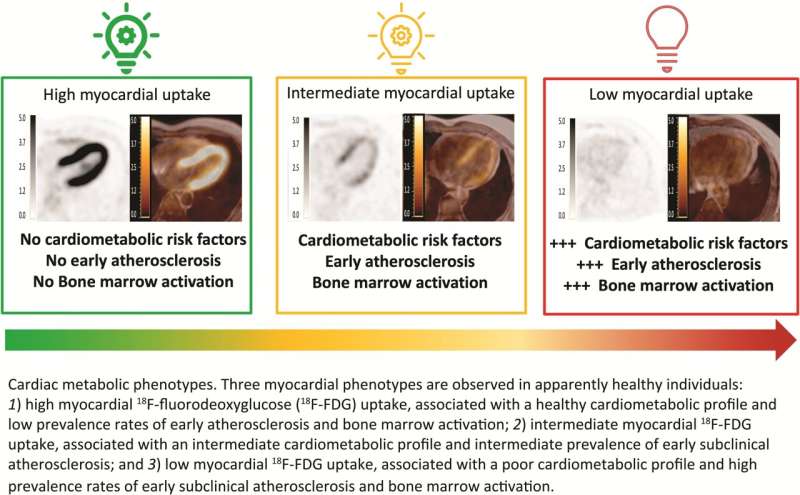Cardiovascular
Obesity, high blood pressure and lipid imbalance trigger progressive loss of energy generation capacity in the heart
Three major cardiovascular risk factors—obesity, hypertension, and dyslipidemia (a high blood concentration of cholesterol or triglycerides)—alter cardiac energy production by interfering in the uptake of the metabolic substrates the heart uses to generate energy. These substrates are mostly fats and glucose, and their altered uptake could be the cause of conditions like heart disease, which appear many years later.
This is the finding of a study published in Diabetes Care and conducted by a team at the Centro Nacional de Investigaciones Cardiovasculares (CNIC) led by the cardiologists Valentín Fuster and Borja Ibáñez. The study shows that this phenomenon occurs very early in apparently healthy middle-aged individuals.
To sustain contraction throughout life, the heart muscle requires an uninterrupted supply of metabolic substrates for energy production. Heart muscle generates energy from a number of substrates, principally fatty acids and carbohydrates (glucose).
The new study shows that metabolic risk factors alter the use of energy substrates by the heart and that this change can promote common conditions, such as heart disease, that appear years later.
Borja Ibañez explained that “the identification of early changes produced in the heart in response to risk factors will help us to increase our knowledge of the mechanisms involved in the onset of diseases like heart failure and eventually devise early interventions to prevent them.”
Dr. Ibáñez, who is CNIC Scientific Director, a cardiologist at Hospital Universitario Fundación Jiménez Díaz, and a group leader in the Spanish cardiovascular research network (CIBERCV), underlined that despite advances in cardiovascular research, “there is still much work to be done to define the underlying causes of heart disease.”
In the study, added Dr. Ibáñez, “we saw that people with this metabolic alteration in the heart show signs of insulin resistance (the earliest stage of diabetes), indicating that the heart in these individuals has become less sensitive to insulin and therefore less able to take up glucose. Ongoing mechanistic studies at the CNIC are aimed at confirming if cardiac insulin resistance is the cause of this early metabolic alteration.”
One of the six scientific programs at the CNIC specifically addresses the function of cardiac muscle and its response to adverse conditions, added Dr. Ibáñez, who leads this program jointly with Dr. Lara-Pezzi.
Ana Devesa, who is the first author on the study, pointed out that the cardiovascular risk factors underlying this altered energy substrate use are those linked to metabolic syndrome: central obesity (increased waist circumference), high triglycerides, low HDL cholesterol, elevated blood sugar, insulin resistance, and high blood pressure.
“In addition to these risk factors,” said Dr. Devesa, “individuals with altered cardiac metabolism were also more likely to have early-stage atherosclerosis.”
Atherosclerosis is the leading underlying cause of death in the world and has a long silent phase before the first symptoms appear.
The identification of atherosclerotic disease in its initial stages and its correlation with other conditions is a central goal of the PESA-CNIC-Santander study (Progression of Early Subclinical atherosclerosis). This longitudinal study was launched in 2010 as a collaboration between the CNIC and Santander Bank and is directed by CNIC Director General Dr. Valentín Fuster, who is also Director of Mount Sinai Heart and Physician-in-Chief at Mount Sinai Hospital, in New York.
PESA-CNIC-Santander includes more than 4,200 apparently healthy middle-aged bank workers (aged 40–55 years at recruitment). Participants undergo periodic examination with advanced imaging techniques and omics analysis of blood samples. The new study was conducted as part of PESA CNIC-Santander.
PESA-CNIC-Santander was recently extended until at least 2029, giving a total follow-up of almost 20 years in all participants, making this study unique in the world.
More information:
Ana Devesa et al, Cardiac Insulin Resistance in Subjects With Metabolic Syndrome Traits and Early Subclinical Atherosclerosis, Diabetes Care (2023). DOI: 10.2337/dc23-0871
Provided by
Centro Nacional de Investigaciones Cardiovasculares Carlos III (F.S.P.)
Citation:
Obesity, high blood pressure and lipid imbalance trigger progressive loss of energy generation capacity in the heart (2023, October 3)
retrieved 3 October 2023
from https://medicalxpress.com/news/2023-10-obesity-high-blood-pressure-lipid.html
This document is subject to copyright. Apart from any fair dealing for the purpose of private study or research, no
part may be reproduced without the written permission. The content is provided for information purposes only.

